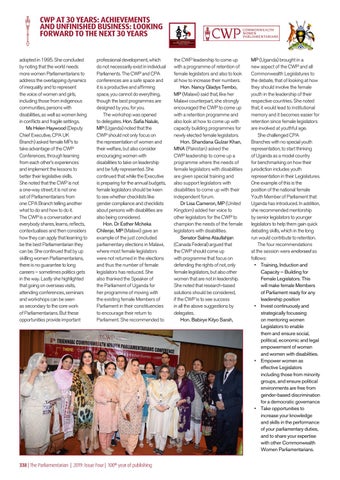CWP AT 30 YEARS: ACHIEVEMENTS AND UNFINISHED BUSINESS: LOOKING FORWARD TO THE NEXT 30 YEARS adopted in 1995. She concluded by noting that the world needs more women Parliamentarians to address the overlapping dynamics of inequality and to represent the voice of women and girls, including those from indigenous communities, persons with disabilities, as well as women living in conflicts and fragile settings. Ms Helen Haywood (Deputy Chief Executive, CPA UK Branch) asked female MPs to take advantage of the CWP Conferences, through learning from each other’s experiences and implement the lessons to better their legislative skills. She noted that the CWP is not a one-way street; it is not one set of Parliamentarians from one CPA Branch telling another what to do and how to do it. The CWP is a conversation and everybody shares, learns, reflects, contextualises and then considers how they can apply that learning to be the best Parliamentarian they can be. She continued that by up skilling women Parliamentarians, there is no guarantee to long careers – sometimes politics gets in the way. Lastly she highlighted that going on overseas visits, attending conferences, seminars and workshops can be seen as secondary to the core work of Parliamentarians. But these opportunities provide important
professional development, which do not necessarily exist in individual Parliaments. The CWP and CPA conferences are a safe space and it is a productive and affirming space, you cannot do everything, though the best programmes are designed by you, for you. The workshop was opened to delegates. Hon. Safia Nalule, MP (Uganda) noted that the CWP should not only focus on the representation of women and their welfare, but also consider encouraging women with disabilities to take on leadership and be fully represented. She continued that while the Executive is preparing for the annual budgets, female legislators should be keen to see whether checklists like gender compliance and checklists about persons with disabilities are also being considered. Hon. Dr Esther Mcheka Chilenje, MP (Malawi) gave an example of the just concluded parliamentary elections in Malawi, where most female legislators were not returned in the elections and thus the number of female legislators has reduced. She also thanked the Speaker of the Parliament of Uganda for her programme of moving with the existing female Members of Parliament in their constituencies to encourage their return to Parliament. She recommended to
338 | The Parliamentarian | 2019: Issue Four | 100th year of publishing
the CWP leadership to come up with a programme of retention of female legislators and also to look at how to increase their numbers. Hon. Nancy Gladys Tembo, MP (Malawi) said that, like her Malawi counterpart, she strongly encouraged the CWP to come up with a retention programme and also look at how to come up with capacity building programmes for newly elected female legislators. Hon. Shandana Gulzar Khan, MNA (Pakistan) asked the CWP leadership to come up a programme where the needs of female legislators with disabilities are given special training and also support legislators with disabilities to come up with their independent forum. Dr Lisa Cameron, MP (United Kingdom) added her voice to other legislators for the CWP to champion the needs of the female legislators with disabilities. Senator Salma Ataullahjan (Canada Federal) argued that the CWP should come up with programme that focus on defending the rights of not, only female legislators, but also other women that are not in leadership. She noted that research-based solutions should be considered, if the CWP is to see success in all the above suggestions by delegates. Hon. Babirye Kityo Sarah,
MP (Uganda) brought in a new aspect of the CWP and all Commonwealth Legislatures to the debate, that of looking at how they should involve the female youth in the leadership of their respective countries. She noted that, it would lead to institutional memory and it becomes easier for retention since female legislators are involved at youthful age. She challenged CPA Branches with no special youth representation, to start thinking of Uganda as a model country for benchmarking on how their jurisdiction includes youth representation in their Legislatures. One example of this is the position of the national female Youth Member of Parliament that Uganda has introduced. In addition, she recommended mentorship by senior legislators to younger legislators to help them gain quick debating skills, which in the long run would contribute to retention. The four recommendations at the session were endorsed as follows: • Training, Induction and Capacity – Building for Female Legislators. This will make female Members of Parliament ready for any leadership position • Invest continuously and strategically focussing on mentoring women Legislators to enable them and ensure social, political, economic and legal empowerment of women and women with disabilities. • Empower women as effective Legislators including those from minority groups, and ensure political environments are free from gender-based discrimination for a democratic governance • Take opportunities to increase your knowledge and skills in the performance of your parliamentary duties, and to share your expertise with other Commonwealth Women Parliamentarians.
